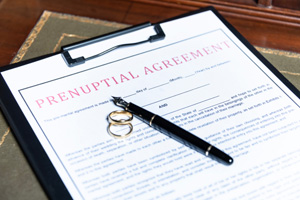
Prenuptial agreements, often known as “prenups,” have gained popularity among couples who want to protect their assets before marriage. In Pennsylvania, a carefully drafted prenuptial agreement clarifies financial expectations and preserves your interests. Exploring what a prenuptial agreement includes and understanding its impact under Pennsylvania law helps anyone considering marriage make informed choices. This guide outlines the benefits, requirements, and steps involved in creating a prenuptial agreement in Pennsylvania.
At Rubin, Glickman, Steinberg & Gifford, P.C., we recognize marriage as a meaningful milestone, symbolizing love, commitment, and unity. Yet, as joyful as this commitment may be, marriage also calls for thoughtful consideration regarding each partner’s financial rights. Prenuptial agreements in Pennsylvania offer couples a practical way to safeguard their finances and ensure clear, mutual understanding regarding future financial matters. At Rubin, Glickman, Steinberg & Gifford, P.C., we understand that discussing a prenuptial agreement may feel delicate, but this conversation promotes transparency and helps build trust.
What Is a Prenuptial Agreement?
A prenuptial agreement is a legal contract created by two individuals before marriage. It defines asset ownership and financial responsibilities during marriage and in case of separation or divorce. In Pennsylvania, prenuptial agreements allow couples to outline financial rights and obligations clearly, reducing potential misunderstandings. Discussing these expectations early can ease tensions and lay a strong foundation for the marriage.
This agreement fosters open communication on financial topics, often sensitive in relationships. It also protects property owned before marriage and clarifies asset division if divorce or death occurs. Addressing these topics upfront strengthens the relationship, promoting mutual respect and transparency.
What Is Included in a Premarital Agreement?
A well-constructed prenuptial agreement often includes terms for property division, spousal support, and debt management. It may also cover asset handling acquired during the marriage and outline each spouse’s financial responsibilities. Key elements include disclosing individual assets and debts to provide transparency.
In Pennsylvania, a prenuptial agreement may specify alimony terms, outlining conditions where one spouse might receive support post-divorce. To ensure enforceability, consult knowledgeable prenuptial lawyers who can structure an agreement that meets legal requirements and reflects both partners’ intentions.
Benefits of Having a Prenuptial Agreement
A prenuptial agreement promotes open financial discussions, building a strong partnership through clear mutual understanding. It safeguards individual property, keeping separate assets intact in the event of a divorce. Having clear terms in place can reduce potential disputes, offering a structured framework for asset division and support.
Having a prenuptial agreement can help establish expectations about financial responsibilities during the marriage, guiding decisions related to spending, saving, and investing. By delineating roles and responsibilities, couples can minimize misunderstandings and foster a collaborative approach to managing finances. This could help a marriage overall.
Additionally, it can serve as a valuable tool for protecting family heirlooms, business interests, or other assets that one partner may want to keep separate. This is particularly important for individuals entering a marriage with significant pre-existing wealth or those who anticipate inheriting assets in the future.
Requirements for a Prenuptial Agreement in Pennsylvania
For a prenuptial agreement to be enforceable, Pennsylvania law requires it to be written and signed by both parties. Verbal agreements hold no weight. Transparency in disclosing each spouse’s assets and liabilities is also essential, as it prevents future claims of coercion or misrepresentation.
Each spouse should have independent legal counsel review the agreement. This step protects both parties’ rights and confirms voluntary participation. Courts may invalidate agreements signed under duress or misunderstanding, so thorough preparation ensures enforceability.
How to Create a Prenuptial Agreement
Creating a prenuptial agreement involves open, honest discussions with your partner about financial expectations and responsibilities. Gathering information on assets, debts, and financial plans is a helpful first step.
Seeking guidance from a family lawyer skilled in prenuptial agreements provides direction on legal standards and customization. The lawyer will draft the document, incorporating asset division and support provisions as discussed. Once both parties review and sign, they each retain a copy of the finalized document.
Contact Rubin, Glickman, Steinberg & Gifford, P.C. for a Consultation
For guidance on Pennsylvania prenuptial agreements, seek legal advice. Rubin, Glickman, Steinberg & Gifford, P.C. offers extensive support in family law, including prenuptial agreements. Our team ensures that your rights remain protected and your financial interests receive attention.
Schedule a consultation with our team to explore how a prenuptial agreement can secure your future and foster open communication. Call Rubin, Glickman, Steinberg & Gifford, P.C. at (215) 822-7575 or use our contact form. We provide professional support to make this process comfortable and clear.

Rubin, Glickman, Steinberg & Gifford P.C.
Pennsylvania Attorney's
January 3, 2025









